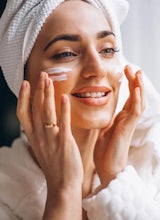Rough Texture Explained
Rough, uneven skin can be caused by the build-up of dead skin cells on the surface of your skin. Normally, dead skin cells are shed through a process called exfoliation. New cells created at the bottom layer of skin move upward, pushing older skin cells to the surface. The dead cells at the very top layer of skin flake or exfoliate away naturally. Surface roughness can also be the result of damage caused by exposure to the sun's UV rays. While rough texture is primarily an issue of appearance, it can affect the application and finish of makeup.

How do Exfoliators Really Work?
While your skin naturally sheds dead skin cells, this process -- known as exfoliation -- may slow down with age. The resulting buildup of dead skin cells can leave your skin looking dull and lifeless. Luckily, the skin-brightening effects of exfoliators can help.
Many exfoliating products contain hydroxy acids, which are versions of natural acids that come from sugar-containing fruits.1 Alpha hydroxy acids (AHAs), such as glycolic acid, help dissolve the bonds of protein that hold the dead skin cells together, making it easier to remove them.2
Beta hydroxy acids (BHAs), such as salicylic acid, are similar to AHAs in that they aid in the shedding process, but they can also enter the pores in certain formulations which helps remove oil and dirt.3
By loosening and removing the top layer of dead skin cells, hydroxy acids can help encourage new surface cells, resulting in skin that is smoother, softer, and more evenly colored. Because these acids can also make your skin more susceptible to sun damage, dermatologists recommend that you apply a broad-spectrum sunscreen with at least SPF 30 protection.1
As with any type of skin care, be careful not to overdo it. If you experience dryness or irritation, you are probably exfoliating too often. Once or twice a week should be enough to achieve smoother, more radiant skin.
We recommend that you consult your dermatologist or physician for proper diagnosis and treatment.
- Mayo Foundation for Medical Education and Research. http://www.mayoclinic.com/health/wrinkle-creams/SN00010
- Dermatology Insights — a patient's guide to healthy skin, hair and nails. American Academy of Dermatology Inc. 2002.
- Lebwohl M, Brown S. Clinical Pearls for Acne and Rosacea. Dialogues in Dermatology Commentaries. 2003;52:4.










